Olympiad of MIPT on electronics for schoolchildren
This year for the first time the Olympiad of MIPT on electronics for schoolchildren of 5-11 grades will be held! What awaits the participants? Challenging tasks, practical work on assembling schemes, prizes and recommendations for applicants!
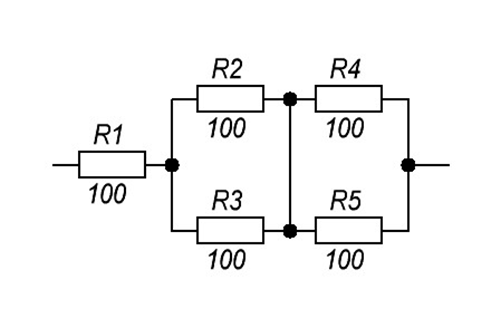

Problems for an example: to find the general resistance of a chain site, to construct the truth table for the scheme
')
You can find all the details about the competition in the social network for Abitu.Net applicants at: http://abitu.net/event/1970
The Olympiad consists of two stages:
In the competition two age categories. Consider them in more detail, since the tasks are radically different.
The online tour lasts 3 hours and contains simple and fun electronic tasks. All tasks have a practical focus: they need to predict the behavior of the device, find errors in the scheme, select the appropriate element and supplement the scheme.
Since there is no such subject as “Electronics” in the school curriculum, and these topics are studied in the textbook for the 8th grade, this age category contains motivating tasks. Of course, the student will answer the tasks better if, for example, he goes to the electronics circle or does homework by himself. But even if he is completely new - we indicated the topics that need to be known, as well as disassembled demo tasks, so it’s not so difficult to prepare and study the material yourself. About topics and literature will be further, in more detail.
The goal is to interest and captivate students with electronics, as well as to enable the circles of electronics to compete in the level of knowledge of their pupils.
Here, for example, analysis of one of the demo tasks. Here I talk about how to build a truth table for a circuit of several logic gates OR NOT. As you can see, it’s not even so much electronics as informatics:
And in this age group everything is already serious: the challenges of the materials from the school curriculum. They cover various topics from school physics, but the emphasis is on electronics. Here, the goal is to identify the most savvy ones in order to work with them in the future as students of the MIPT. Online tour lasts 4 hours.
Here is an example for you - analysis of the first demonstration task. She and not every adult specialist decides, is not it? Only the most hardcore tasks from the Department of General Physics at MIPT!
Immediately the answer to a frequent question: how many points does the Olympiad give to the Unified State Exam? The answer is this: at the moment - not at all, because this year the Olympiad is held for the first time. Therefore, while the prize is this: points in the cadastre of applicants and recommendations from the organizers for admission to the Fiztech School of Radio Engineering and Computer Technologies (CTFT), as well as developing gifts and passing to the final stage for the next year, when the Olympiad may become leveled
Our goal is to make the Olympiad level, so that it gives 100 points for the exam in physics. But for this, the Olympiad must start successfully this year and pass on key characteristics, such as the number of participants.
What is the difference between our Olympiad from many others?
First, the full-time stage will be held with the design of circuits on the breadboard! We believe that electronics is impossible without practice, and collecting circuits is something new at the Olympiads.
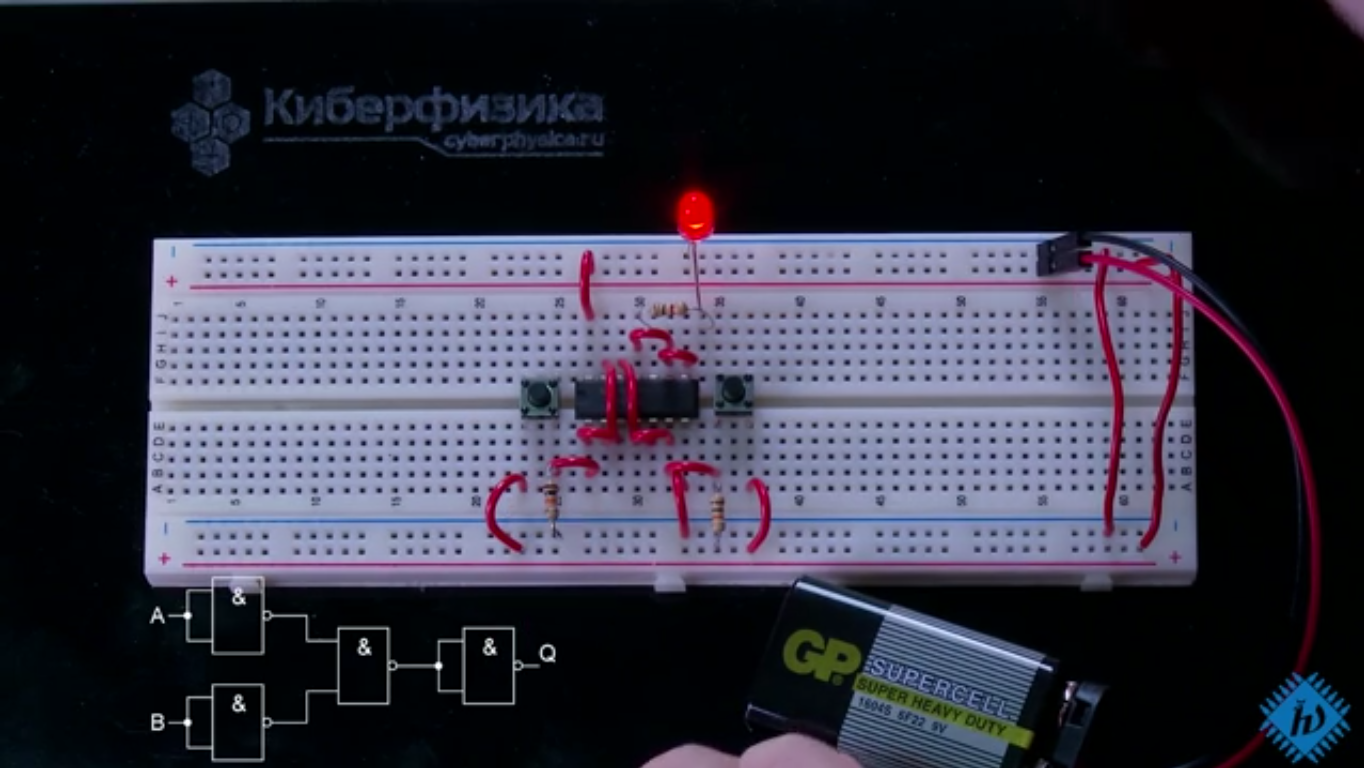
In the analysis of demo problems, we not only explain how to solve them, but also show the solution “live” - from electronic components.
Secondly, we tried to make the tasks from the “motivating part” similar to the British electronics exam GCSE Electronics. British schoolchildren can choose it as one of the electives when they receive a certificate of general secondary education. From the materials of the test, we can conclude that the exam is quite complicated, while the tasks in it are very interesting, and do not at all resemble the exam. Our opinion is that Russian schoolchildren should reach for this bar and not be inferior to British peers.

Image source - video to prepare for the British exam in electronics
Thirdly, the motivating part of the Olympiad is very important for us. We want very much that at the Olympiad schoolchildren have a chance to get acquainted with electronics and become interested in it at the earliest possible age: not even in 8-11 grades (when everyone already thinks about the unified state examination and enrollment), but in grades 5-6. The experience of school technical circles shows us that already at this age young talent is able to understand the basics of electronics and digital logic.
There are more and more circles of electronics - on the wave of interest in hobby robotics, comes the realization that without electronics robotics is impossible. For our circles, the Olympiad is a chance to check the level of their students, a chance to prove to parents that children are not doing nothing. If you have familiar heads of circles in electronics or robotics - send them our article, we will be very grateful!
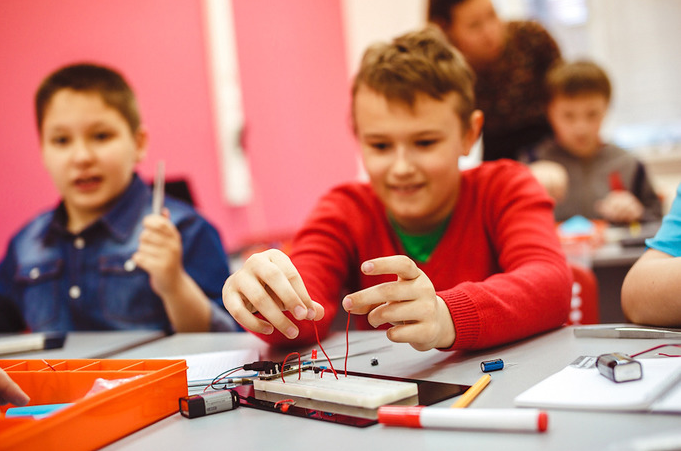
Photos from the study circle on electronics in the "League of Robots". Where to put your talents to the students of the circles? There is a lot of competition in hobby robotics, but there are a few electronics units ...
To prepare for the Olympiad, we have prepared and offer you a tentative list of topics. In full, it can be viewed on the site, but if in brief:
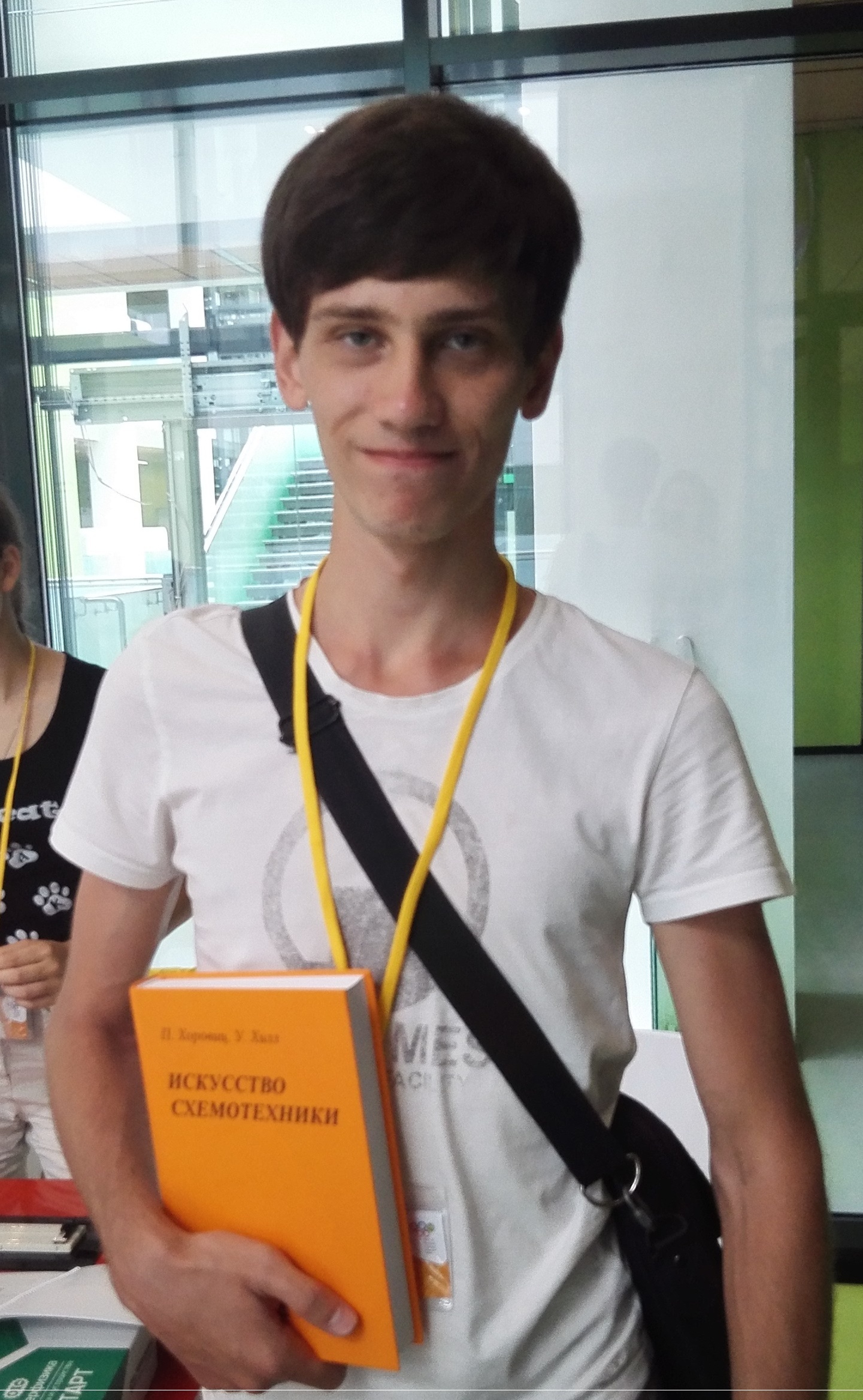 The bibliography for the preparation for the Olympiad was also worthy: not only textbooks, but also popular literature that can interest and captivate. Here is the literature for grades 5–8, and for older ones, the corresponding textbooks on physics for grades 9–11 are also added to the list.
The bibliography for the preparation for the Olympiad was also worthy: not only textbooks, but also popular literature that can interest and captivate. Here is the literature for grades 5–8, and for older ones, the corresponding textbooks on physics for grades 9–11 are also added to the list.
The last position from the list should be well known to the habrovans thanks to the posts of YuriPanchul . This is a textbook for universities, but it is written in clear language, there are simple chapters on the basics of digital electronics.
“The Art of Circuit Engineering” by Horowitz and Hill we didn’t include in the list of references, although we know that there are talented young people who can do it!
I want to share my story about the importance of Olympiads in the vocational guidance of schoolchildren.
I was 13 years old when I became interested in linguistics. How? Indeed, in the school there is no such subject. The answer is simple: linguistics was among the disciplines of the Olympiad "Tournament Lomonosov," there were interesting puzzles on logical thinking and language intuition. I liked them so much that I discussed with interest problems with other contestants, began to read books on linguistics and wanted to go to university to the relevant faculty. As a result, my life was different, and I got a programmer’s education, but you must agree - linguistics and exact sciences are very closely related. Before that Olympiad, I could not imagine what I wanted to do: some subjects were liked more than others, but I didn’t have a professional desire to study them.
I would like the children to have their eyes lit up as a result of our Olympiad and that these guys would say: “Now I know what I want! I want to become an engineer and develop electronic devices! ”That is the goal of incorporating a non-school program into the Olympiad: broadening the mind and giving students an idea of a new discipline for them.
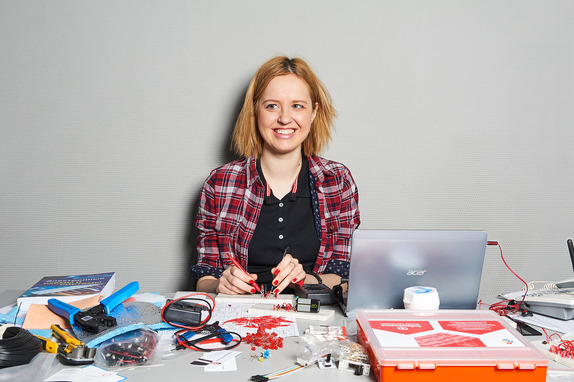 The author is Tatyana Volkova , a specialist in educational and methodical work at CIET MIPT (direction of supporting the development of technical creativity), developer of Cyber Physics products .
The author is Tatyana Volkova , a specialist in educational and methodical work at CIET MIPT (direction of supporting the development of technical creativity), developer of Cyber Physics products .


Problems for an example: to find the general resistance of a chain site, to construct the truth table for the scheme
')
You can find all the details about the competition in the social network for Abitu.Net applicants at: http://abitu.net/event/1970
The Olympiad consists of two stages:
- Online stage : December 16 - March 1, 2017.
- Full-time stage : end of March 2017
In the competition two age categories. Consider them in more detail, since the tasks are radically different.
5-8 class
The online tour lasts 3 hours and contains simple and fun electronic tasks. All tasks have a practical focus: they need to predict the behavior of the device, find errors in the scheme, select the appropriate element and supplement the scheme.
Since there is no such subject as “Electronics” in the school curriculum, and these topics are studied in the textbook for the 8th grade, this age category contains motivating tasks. Of course, the student will answer the tasks better if, for example, he goes to the electronics circle or does homework by himself. But even if he is completely new - we indicated the topics that need to be known, as well as disassembled demo tasks, so it’s not so difficult to prepare and study the material yourself. About topics and literature will be further, in more detail.
The goal is to interest and captivate students with electronics, as well as to enable the circles of electronics to compete in the level of knowledge of their pupils.
Here, for example, analysis of one of the demo tasks. Here I talk about how to build a truth table for a circuit of several logic gates OR NOT. As you can see, it’s not even so much electronics as informatics:
9-11 class
And in this age group everything is already serious: the challenges of the materials from the school curriculum. They cover various topics from school physics, but the emphasis is on electronics. Here, the goal is to identify the most savvy ones in order to work with them in the future as students of the MIPT. Online tour lasts 4 hours.
Here is an example for you - analysis of the first demonstration task. She and not every adult specialist decides, is not it? Only the most hardcore tasks from the Department of General Physics at MIPT!
Immediately the answer to a frequent question: how many points does the Olympiad give to the Unified State Exam? The answer is this: at the moment - not at all, because this year the Olympiad is held for the first time. Therefore, while the prize is this: points in the cadastre of applicants and recommendations from the organizers for admission to the Fiztech School of Radio Engineering and Computer Technologies (CTFT), as well as developing gifts and passing to the final stage for the next year, when the Olympiad may become leveled
Our goal is to make the Olympiad level, so that it gives 100 points for the exam in physics. But for this, the Olympiad must start successfully this year and pass on key characteristics, such as the number of participants.
Olympiad specifics
What is the difference between our Olympiad from many others?
First, the full-time stage will be held with the design of circuits on the breadboard! We believe that electronics is impossible without practice, and collecting circuits is something new at the Olympiads.

In the analysis of demo problems, we not only explain how to solve them, but also show the solution “live” - from electronic components.
Secondly, we tried to make the tasks from the “motivating part” similar to the British electronics exam GCSE Electronics. British schoolchildren can choose it as one of the electives when they receive a certificate of general secondary education. From the materials of the test, we can conclude that the exam is quite complicated, while the tasks in it are very interesting, and do not at all resemble the exam. Our opinion is that Russian schoolchildren should reach for this bar and not be inferior to British peers.

Image source - video to prepare for the British exam in electronics
Thirdly, the motivating part of the Olympiad is very important for us. We want very much that at the Olympiad schoolchildren have a chance to get acquainted with electronics and become interested in it at the earliest possible age: not even in 8-11 grades (when everyone already thinks about the unified state examination and enrollment), but in grades 5-6. The experience of school technical circles shows us that already at this age young talent is able to understand the basics of electronics and digital logic.
There are more and more circles of electronics - on the wave of interest in hobby robotics, comes the realization that without electronics robotics is impossible. For our circles, the Olympiad is a chance to check the level of their students, a chance to prove to parents that children are not doing nothing. If you have familiar heads of circles in electronics or robotics - send them our article, we will be very grateful!

Photos from the study circle on electronics in the "League of Robots". Where to put your talents to the students of the circles? There is a lot of competition in hobby robotics, but there are a few electronics units ...
Topics and References
To prepare for the Olympiad, we have prepared and offer you a tentative list of topics. In full, it can be viewed on the site, but if in brief:
- For schoolchildren of 5-8 classes, these are electrical circuits (Ohm's law, parallel and serial connections), radio components (resistors, LEDs, capacitors, transistors, and others), digital microcircuits (counters, triggers, multiplexers, decoders), computer science fundamentals (binary numbering , logic gates)
- For 9th graders and older students, this is a school program in physics: electronics, electrical engineering, thermodynamics, mechanics, and other topics. The task can be caught from any section, since the Olympiad tests the participant’s knowledge, including the entire school curriculum in physics.
 The bibliography for the preparation for the Olympiad was also worthy: not only textbooks, but also popular literature that can interest and captivate. Here is the literature for grades 5–8, and for older ones, the corresponding textbooks on physics for grades 9–11 are also added to the list.
The bibliography for the preparation for the Olympiad was also worthy: not only textbooks, but also popular literature that can interest and captivate. Here is the literature for grades 5–8, and for older ones, the corresponding textbooks on physics for grades 9–11 are also added to the list.- Peryshkin A.V. Physics. 8th grade. Textbook.
- Petzold H. Code. The secret language of computer science.
- Platt Ch. Electronics for beginners.
- Revich Yu.V. ABC electronics.
- Revich Yu.V. Entertaining electronics.
- Svoren R.A. Electronics. Step by step.
- Harris D., Harris S. Digital Circuit Design and Computer Architecture
The last position from the list should be well known to the habrovans thanks to the posts of YuriPanchul . This is a textbook for universities, but it is written in clear language, there are simple chapters on the basics of digital electronics.
“The Art of Circuit Engineering” by Horowitz and Hill we didn’t include in the list of references, although we know that there are talented young people who can do it!
Lyrical digression
I want to share my story about the importance of Olympiads in the vocational guidance of schoolchildren.
I was 13 years old when I became interested in linguistics. How? Indeed, in the school there is no such subject. The answer is simple: linguistics was among the disciplines of the Olympiad "Tournament Lomonosov," there were interesting puzzles on logical thinking and language intuition. I liked them so much that I discussed with interest problems with other contestants, began to read books on linguistics and wanted to go to university to the relevant faculty. As a result, my life was different, and I got a programmer’s education, but you must agree - linguistics and exact sciences are very closely related. Before that Olympiad, I could not imagine what I wanted to do: some subjects were liked more than others, but I didn’t have a professional desire to study them.
I would like the children to have their eyes lit up as a result of our Olympiad and that these guys would say: “Now I know what I want! I want to become an engineer and develop electronic devices! ”That is the goal of incorporating a non-school program into the Olympiad: broadening the mind and giving students an idea of a new discipline for them.
 The author is Tatyana Volkova , a specialist in educational and methodical work at CIET MIPT (direction of supporting the development of technical creativity), developer of Cyber Physics products .
The author is Tatyana Volkova , a specialist in educational and methodical work at CIET MIPT (direction of supporting the development of technical creativity), developer of Cyber Physics products .Source: https://habr.com/ru/post/320344/
All Articles